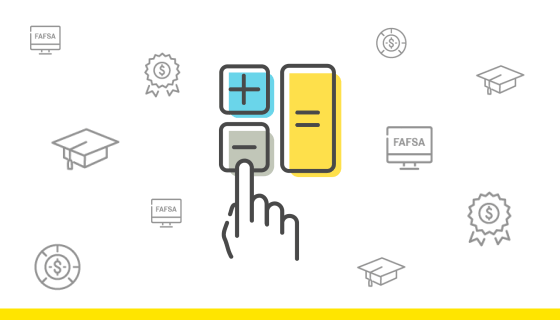
Try Our Net Price Calculator
5 minutes is all it takes to estimate what you'll pay.
Before you choose a college based on cost, check out the merit scholarships we offer new freshmen — from $12,000 to $30,000 annually. And use our Net Price Calculator to determine your full financial picture.
Your College Scholarships Made Simple
In 2023–2024, the average freshman award was $37,965 in scholarships and grants. We’ll automatically consider you for academic scholarships when you apply to St. Edward’s. No additional application is required.
At St. Edward’s, we’re invested in your future. Our nationally ranked educational experience is personalized to your goals — equipping you for today’s careers and those in the decades to come.
2024–2025 Academic Scholarships
All new freshmen admitted through regular admission will be considered for our merit scholarships.
Students will be evaluated for merit scholarships based on high school GPA, class rank (if available), and the academic experience pursued in high school. St. Edward’s University uses a holistic review process. Although GPA and academic information are the most important components, you will also be considered based on your demonstrated ability to be successful at St. Edward's. See all of our application requirements.
U.S. citizens residing outside of Texas also qualify for the Edwardian Scholarship, an additional award of $3,000. Holy Cross high school graduates who meet this qualification will receive the Sorin Award and are not eligible for the Edwardian Scholarship.
These scholarships do not require an additional application beyond the application for admission. Students who receive athletic scholarships may not be eligible for all of the scholarships and grants listed below. Freshman applicants should submit a completed application for admission by the Feb. 1 priority deadline in order to be fully considered for all scholarships and need-based grants.
The Department of Education is making significant changes to the Free Application for Federal Student Aid (FAFSA) this year, and St. Edward's University remains committed to helping families during the financial aid process. New freshmen are strongly encouraged to submit a FAFSA to St. Edward's by the May 1 priority deadline, and all FAFSA filers will be considered for additional grant aid. The St. Edward's University school code is 003621.
We offer new freshmen up to
$30,000 per year in merit scholarships
Average tuition paid by our first-year students who received scholarships and/or grants
Average merit scholarship and/or grant awarded to first year students
How Much Does College Cost?
Deciphering the real cost of college can be complicated, but it doesn't have to be. It starts by understanding what you'll pay after you're awarded scholarships and grants. At St. Edward's, the average tuition paid by first-year students is less than half the sticker price.
2024–2025 Holy Cross Scholarships
If you don't qualify for one of our academic scholarships, you may still be considered for one of our merit-based Holy Cross scholarships.
| Scholarship | Amount | Requirements |
|---|---|---|
| Sorin Award | $10,000 Annually | Must graduate from a Holy Cross high school and meet the February 1 priority deadline |
| Moreau Scholarship | Full tuition for the freshman year, plus the amount equal to freshman year tuition in subsequent years, for one graduate from each Holy Cross high school. | Must graduate from a Holy Cross high school. The ideal candidate is among the top students in their class, with a strong academic profile, significant leadership experience, and community-service involvement. The award seeks to recognize students who have been outstanding representatives of Holy Cross values in the classroom and in the community. Requires a separate application, which must be received with an application for admission by Dec. 15. Apply for the Moreau Scholarship. |
2024–2025 Theater, ROTC and Athletic Scholarships
We also have merit scholarships available for students who excel in these areas.
| Scholarship | Amount | Requirements |
|---|---|---|
| Theater Arts Scholarships | $500–$5,000 Annually |
Must be a Theater Arts major, maintain a 2.5 GPA or higher, and audition in one of four areas (General Theater, Acting, Theater Design and Technology, or Theater Management). Requires a separate application and audition, which is held on campus in February. |
| ROTC Scholarships | Varies | St. Edward’s students have the opportunity to participate in ROTC programs thanks to crosstown agreements with the UT Austin Air Force ROTC, Army ROTC, and Navy ROTC programs. If you are interested, please reference the scholarship page for each respective branch: Air Force ROTC scholarships, Army ROTC scholarships, Navy ROTC scholarships. You can also learn more here. |
| Varsity Athletic Scholarships | Varies |
Coaches award scholarships to men and women to compete in NCAA Division II athletics in baseball/softball, basketball, volleyball (women only), cross country, soccer, stunt, indoor and outdoor track, and cheerleading. Contact the athletics department at 512-448-8448 for more information. St. Edward's University received eight rankings for student athletes from College Factual. |
Deadlines, Policies and Contact
Ready to get started? Get a head start on upcoming deadlines and review our policies. Contact us directly with any questions. We're here to help!
Office of Admission
seu.admit@stedwards.edu
512-448-8500

